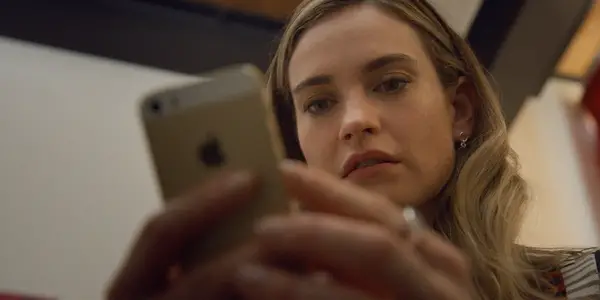TIFF 2025: Girl and Swiped

Wilson is a cinema enthusiast based out of Toronto, Canada.…
There’s usually no shortage of female filmmakers at the Toronto International Film Festival, and with the festival’s 2025 edition, that continues to be true. With Girl, we get the directorial debut of legendary Taiwanese actress Shu Qi, which is a rather bleak depiction of girlhood in 1980s Taiwan. Rachel Lee Goldenberg‘s Swiped – a biopic of Whitney Wolfe Herd – on the other hand, tackles the often toxic and misogynistic workplace dynamics experienced by women in a much more palatable manner.
Girl (dir. Shu Qi)
Given how prolific and talented Shu Qi has been as an actress, it’s hard not to root for her as a first time filmmaker. And while there’s certainly signs of true inventiveness sprinkled throughout Girl, the film, which Qi also wrote, ultimately falls flat. It’s a well intentioned effort that unfortunately resulted in a puzzling narrative that puts audiences through the wringer to questionable results at best.
Set in 1980s Taiwan, Lin Hsiao-lee (Bai Xiao-Ying) grows up in an abusive household with her younger sister, and feels helpless as she yearns for a better life. Her parents (9m88 and Roy Chiu) are inherently problematic, and each contribute to Hsiao-lee’s devastating childhood in their own ways.

To say that Girl is an uneasy watch would be a huge understatement. The film captures instances of abuse almost perpetually, whether it be directly or through more subtle narrative inflections, to the point of exhaustion. Scenes aren’t necessarily depicted with any semblance of exploitation, but the repetitive nature of these depictions truly felt unnecessarily. Qi does have a keen eye in creating scenes that could be both overtly graphic or more quietly devastating, and perhaps her intention was to emulate the abusive cycle into the narrative structure of the film. That being said, there are more subtle ways of doing this, and she likely needed to reel back on some of her creative choices here.
Having worked as an actress for so many legendary directors in the past, Qi seems to have learned from the best, and does demonstrate herself to be a patient and thoughtful filmmaker. Most scenes feel focused and she certainly knows how to frame her narrative within a confined space. Jing-Pin Yu’s cinematography also adds a level of melancholy to the film, and much like the raw emotions within the story itself, feel stripped down.
Bai is excellent as the film’s unfortunate protagonist, and carries the story with devastating grace. There’s a sense of maturity to her character, and Qi’s screenplay seems to purposefully void itself of any levity you might expect from a story centred around a child. This works for the most part, given Girl’s very bleak worldview, but the film does seem to set itself up towards some glimmer of light, only to have that not be fully realized. It’s perhaps a consistent ending to the type of story Qi set out to make, but the brutal journey unfortunately doesn’t feel justified at all. Alas, the film is simply too bleak and emotionally empty for its own good.
Swiped (dir. Rachel Lee Goldenberg)
Chronicling the creation of Tinder and Bumble through the eyes of Whitney Wolfe Herd – who served as the co-founder and founder of each app, respectively – Swiped is a surprisingly astute indictment on workplace sexism and gender inequalities at large. Starring an always excellent Lily James, Rachel Lee Goldenberg has crafted a film that leans heavily on commercial filmmaking tendencies, while also defying those tendencies with its sharp and insightful social commentary.
Spanning the early days of Tinder and Bumble, Swiped follows Whitney Wolfe (James) as she traverses the very male-centric tech startup industry. After playing a very important role in creating Tinder, she’s ultimately kept out of the limelight by her male counterparts, and eventually creates a dating app centred around the female experience with Bumble. The film also features performances by Dan Stevens, Myha’la, Jackson White, Ben Schnetzer, and Dermot Mulroney.

What’s surprising about Swiped isn’t how entertaining it is as a commercial film, but how it utilizes its commercialization to repackage a story about sexism in a relatively digestible fashion. Much like Wolfe and her inventive approach to the online dating industry, Goldenberg finds ingenuity in dissecting serious issues within a clear cut commercial film. That’s not to say that Goldenberg waters down her prosecution of how unjust the male-centric workplace can be, as Swiped maintains a rather thorny depiction of how harrowing these situations can be. One scene, in particular, with Wolfe experiencing an anxiety attack after a string of personal attacks online, is extremely riveting and carried through with perfection by James.
Injecting serious discourse within a commercial film is nothing new, but Goldenberg‘s mirroring of defying conventional expectations, which is such an important theme within Swiped, is such a perfect example of aligned synchronicity. Seeing James in a leading role that actually utilizes her underrated talent as an actress is also refreshing, and hopefully a sign of what’s to come for her career.
Simply put, Swiped had no reason to be this good. Its appeal as an entertaining commercial film is fairly obvious, but its inclination as a socially conscious appraisal of gender dynamics in the workplace – and in society at large – is a welcome surprise that elevates it to much higher heights. This might not be an exceptional piece of filmmaking by conventional standards, but Goldenberg should be lauded for her creative intuitions in refining a narrative that could have easily felt stale or overwrought. There’s no melodrama here, just a neatly packaged reflection of the hard truth.
Follow our coverage of TIFF 2025 here!
Does content like this matter to you?
Become a Member and support film journalism. Unlock access to all of Film Inquiry`s great articles. Join a community of like-minded readers who are passionate about cinema - get access to our private members Network, give back to independent filmmakers, and more.
Wilson is a cinema enthusiast based out of Toronto, Canada. He escapes from his day job by writing random thoughts about cinema on the internet. Although he has a longstanding penchant for Hong Kong cinema, he considers himself to be an advocate for Asian cinema in general. He has been attending the Toronto International Film Festival every year since 2005, and more of his work can be found on his website: www.wilson-kwong.com.













